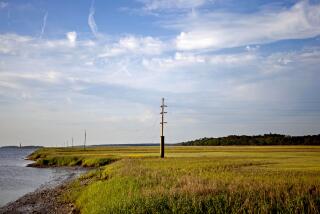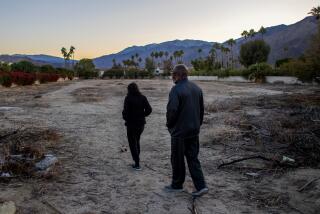Residents Fighting for Preservation of Historically Black Resort on Florida Coast
- Share via
AMERICAN BEACH, Fla. — This mile-long strip of sand flourished during the Jim Crow era, when blacks weren’t welcome at the ritzy white-only resorts along Florida’s Atlantic coastline.
It has gone into decline since segregation ended, but the few remaining residents are fighting to preserve it and keep it safe from the hungry eye of developers.
“They deserted this place,” said William Watson, a retired teacher who bought a lot in American Beach for $2,400 in 1976 and is one of the 30 people who live here year-round. “I wasn’t really interested, but at that time all the blacks had gone to Jacksonville Beach.”
Now he worries about the town’s future. “Taxes are going up, and the people who were here years ago don’t have the income to keep up with it,” he said. “They’ll be property-rich--poor people with property.”
The land has become a prime target of developers, but residents are hoping to head them off by having it added to the National Register of Historic Places.
Last summer, American Beach was listed on the state’s Black Heritage Trail, and residents hope to attract tourist dollars with jazz and heritage festivals.
A leader of the efforts to preserve American Beach, 15 miles north of Jacksonville, is MaVynee Betsch, granddaughter of the man who helped found the community nearly 70 years ago.
A. L. Lewis’ Jacksonville-based Afro-American Life Insurance Co. was one of several black-owned insurance companies that were, Betsch says, “like our own little banks.” It also offered social activities and free medical exams. “Black people did their own thing,” Betsch said. “We didn’t have to ask white folks for nothing.”
The company, now defunct, purchased much of American Beach. The rest came from a land grant gained through the assistance of Eleanor Roosevelt.
The town was known in the 1940s and ‘50s for attracting both working-class blacks and professionals, she said. “They had cottages along here, and even the working people could stay here,” Betsch said. “That’s why we fight so to keep it.”
Not far away is Amelia Island Plantation, a luxury resort for anyone--black or white--who can afford to pay up to hundreds of dollars for a night’s stay.
One black family from Philadelphia frequents both places. Carol Alexander and her husband, Alfonzo Washington, discovered American Beach while staying at the fancy hotel.
“We were just driving around, and I said ‘Al, there’s black people here!’ ” she said.
Alexander, who has since become friends with Betsch, said the community is so quiet she feels safe letting her 2-year-old son wander off to collect seashells.
Watson, whose cedar-paneled hideaway has a balcony that looks out on the sea, marvels at his good fortune. As he showed off the view to a visitor, he pointed out the Ritz-Carlton in the near distance. “Six hundred dollars for a commanding view of the ocean,” he noted.
Betsch added: “And we got it for free.”






